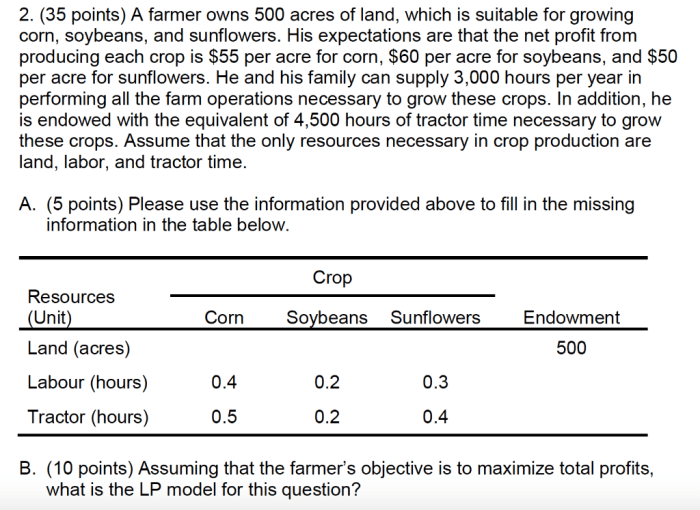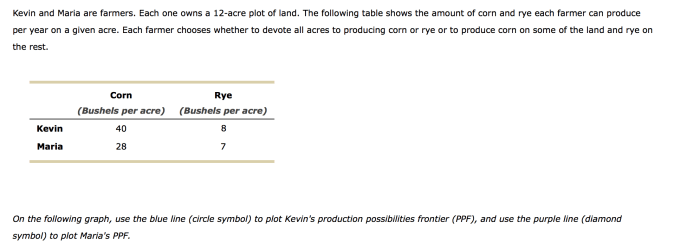Farmer smith owns 100 acres – Step into the world of Farmer Smith, where 100 acres of land are cultivated with passion and purpose. His innovative farming techniques, unwavering commitment to sustainability, and deep-rooted ties to the community paint a captivating portrait of modern agriculture.
From the vast fields to the bustling barns, this invites you on a journey to explore the intricacies of Farmer Smith’s 100-acre domain.
Land Management and Agricultural Practices

Farmer Smith employs a combination of traditional and modern farming techniques to optimize productivity and sustainability on his 100-acre farm. Crop rotation, cover cropping, and integrated pest management are central to his practices, ensuring soil health and biodiversity.
Crop Production
Smith cultivates a diverse range of crops, including corn, soybeans, wheat, and alfalfa. Crop rotation is implemented to prevent soil depletion and maintain fertility. Leguminous crops like alfalfa fix nitrogen in the soil, enriching it for subsequent crops.
Livestock Management
Smith raises livestock, including cattle and poultry, on rotational grazing pastures. This practice promotes healthy vegetation growth, reduces soil erosion, and minimizes methane emissions from livestock.
Sustainability Practices
Smith prioritizes sustainable practices to protect the farm’s ecosystem. Cover crops, such as clover and ryegrass, are planted during fallow periods to prevent soil erosion, enhance soil structure, and attract beneficial insects.
Farm Operations and Infrastructure

Farmer Smith’s 100-acre farm is a bustling hub of activity, with a well-organized layout and state-of-the-art equipment to ensure efficient operations.
Machinery and Equipment
The farm is equipped with a range of modern machinery, including tractors, harvesters, planters, and sprayers. These machines are designed to automate tasks, improve efficiency, and reduce labor costs. For example, GPS-guided tractors allow for precise planting and cultivation, minimizing waste and maximizing yields.
Farm Layout
The farm is divided into several fields, each dedicated to a specific crop or livestock operation. The fields are connected by a network of roads and waterways to facilitate access and irrigation. Barns and other structures are strategically placed to support livestock operations, storage, and equipment maintenance.
Technology in Farm Operations
Technology plays a vital role in streamlining farm operations. Farmer Smith uses sensors to monitor soil moisture, temperature, and crop health. This data is analyzed to optimize irrigation schedules, fertilizer application, and pest control measures. Additionally, automated feeding systems ensure that livestock receive a consistent and balanced diet.
Economic Impact and Market Analysis

Farming 100 acres can have a significant economic impact on a local and regional level. The financial implications of such an operation must be carefully considered, as well as the potential markets for the farm’s products.
The local market for farm products is often driven by demand from consumers seeking fresh, locally sourced food. Establishing relationships with local restaurants, grocery stores, and farmers’ markets can provide valuable outlets for farm products. Regional markets may offer opportunities for larger-scale sales to distributors or processors.
Diversification and Value-Added Products
Diversifying the farm’s product offerings can reduce risk and increase profitability. For example, a farmer may choose to raise livestock in addition to growing crops, or offer value-added products such as jams, jellies, or baked goods made from farm-grown ingredients.
Environmental Considerations: Farmer Smith Owns 100 Acres

Farmer Smith’s farming practices are guided by a commitment to environmental sustainability. The farm recognizes the delicate balance between agricultural production and the preservation of natural resources.
Water Conservation
Water is a precious resource, and the farm has implemented several strategies to conserve it. Drip irrigation systems minimize water usage by delivering water directly to the roots of crops, reducing evaporation and runoff. Additionally, the farm utilizes rainwater harvesting techniques to collect and store rainwater for irrigation purposes.
Farmer Smith’s vast 100-acre farm provides ample space for his livestock to roam. When seeking respite from the bustling farm life, he enjoys venturing to the Elks Lodge in Bullhead City, Arizona ( elks lodge bullhead city az ). The lodge offers a serene retreat where he can socialize with fellow members and enjoy the tranquility of the surrounding nature.
Refreshed and invigorated, Farmer Smith returns to his farm, ready to tend to his land and care for his animals.
Wildlife Habitat Protection
The farm provides habitat for a variety of wildlife species. Native plants and hedgerows create corridors that allow animals to move freely and access food and shelter. Conservation tillage practices, which minimize soil disturbance, preserve the habitat of ground-dwelling animals and insects.
Carbon Sequestration, Farmer smith owns 100 acres
Farming practices at Farmer Smith’s contribute to carbon sequestration, the process of removing carbon dioxide from the atmosphere. Cover crops, such as clover and ryegrass, are planted to capture carbon in the soil. The farm also maintains a portion of its land as natural forest, which acts as a carbon sink.
Social and Community Impact

Farmer Smith is an integral part of the local community, playing a crucial role in its social and economic well-being. The farm is not just a source of livelihood; it is a symbol of the area’s rich agricultural heritage and a gathering place for the community.
The farm contributes significantly to the local economy by providing jobs and supporting businesses that rely on agricultural products. It also enhances food security by supplying fresh, locally grown produce to the community, ensuring access to healthy and affordable food.
Social and Cultural Significance
Farming has deep social and cultural roots in the area. It has shaped the community’s identity and fostered a sense of belonging. The farm serves as a venue for community events, such as harvest festivals and farmers’ markets, strengthening social bonds and preserving local traditions.
FAQ
How does Farmer Smith maintain soil health on his 100 acres?
Through crop rotation, cover cropping, and minimal tillage practices, Farmer Smith ensures the long-term vitality of his soil.
What role does technology play in Farmer Smith’s farming operations?
Farmer Smith utilizes precision agriculture techniques, such as GPS guidance and data analytics, to optimize crop yields and resource efficiency.
